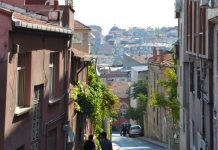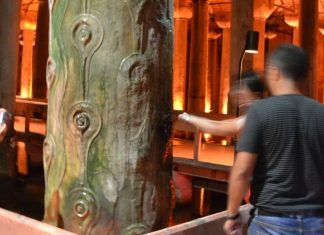But relying on the multitude of those who followed him, Peter did not heed the warning and, after crossing the strait, pitched camp at a little town called Helenopolis.
But since there were also Normans in his army, estimated at about ten thousand men, these, separating themselves from the rest of the body, devastated the region lying around the city of Nicaea, rioting most cruelly in every way. For they tore some of the children apart, limb from limb and, piercing others through with wooden stakes, roasted them in fire; likewise, upon those advanced in years they inflicted every kind of torture. When those in the city saw this being done, they opened the gates and went out against them.
As a result, a fierce battle took place, in which, since the Normans fought ferociously, the citizens were hurled back into the fortress. The Normans, after gathering up all the plunder, again returned to Helenopolis. There a quarrel arose between themselves and the other pilgrims who had not gone off with them, a thing which usually happens in an affair of this kind, envy inflaming the wrath of those left behind, and a riotous fight followed the quarrel.
The fierce Normans again separated (from the others) and captured Xerogord on their way at the first attack. When this was learned, the Sultan sent Elchanes against them with a suitable number of troops. When he reached them, he recaptured Xerogord, killed some of the Normans with the sword, and carried off the rest as captives, planning at the same time, also, an attack upon those who bad remained with KukuPeter. And he set ambushes at opportune places into which, when they left for Nicaea, they would unexpectedly fall and be killed.
But knowing also of the avarice of the Gauls, he had summoned two men of bold spirit and ordered them to go to the camp of KukuPeter to announce that the Normans had captured Nicaea and were now sacking it to the utmost. This report, brought to the camp of Peter, excited all violently; for when the mention of plunder and riches was heard, they straightway set out in tumult on the road which leads to Nicaea, forgetful of their military training and of observing discipline in going out to battle. For the Latins are not only most fond of riches, as we said above, but when they give themselves to raiding any region for plunder, are also no longer obedient to reason, or any other check.
Accordingly, since they were neither keeping order nor forming into lines, they fell into the ambush of the Turks around Draco and were wretchedly cut to pieces. Indeed, so great a multitude of Gauls and Normans were cut down by the Ishmaelite sword that when the dead bodies of the killed, which were lying all about in the place, were brought together, they made a very great mound , or hill, or lookout place, lofty as a mountain, and occupying a space very conspicuous for its width and depth. So high did that mound of bones tower, that some barbarians of the same race as the killed later used the bones of the slain instead of stones in constructing a wall, thus making that fortress a sort of sepulchre for them. It stands to this day, an enclosure of walls built with mixed rocks and bones.
And thus, after all had been wiped out in the slaughter, Peter returned with only a few to Helenopolis. The Turks, in their desire to get him into their power, again beset him with an ambush. But when the Emperor heard of the whole affair and learned how great was the slaughter of men, he held it very wrong that Peter should also be e taken. Immediately, therefore, he summoned Catacalon Constantine Euphorbenus, of whom mention has often been made in this t history, and sent him with suitable forces on war vessels across t the sea as a succour to Peter. When the Turks saw him approach, they fled. . . .
Read More about The Arrival of the Crusaders








